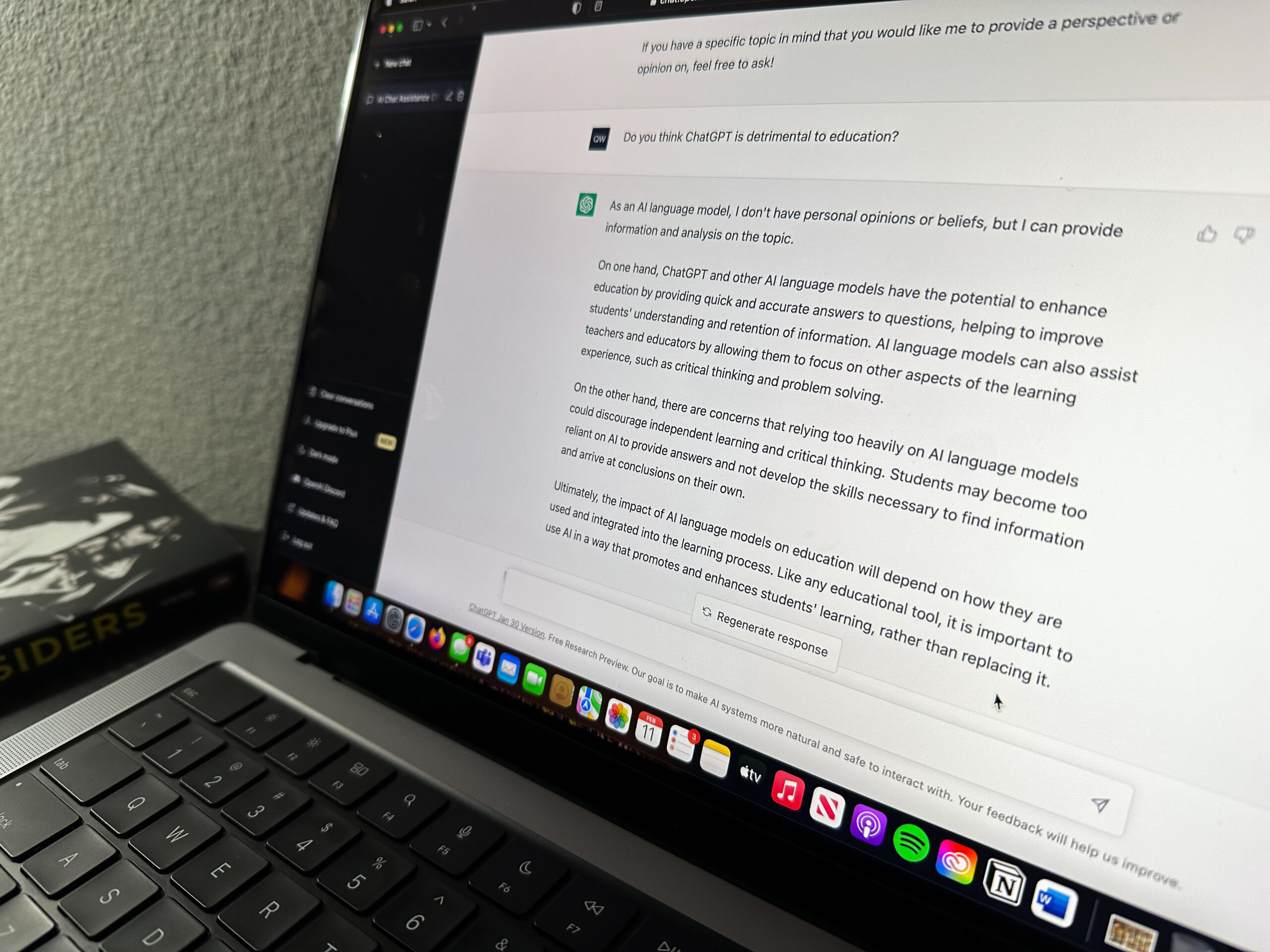OPINION: ChatGPT is the catalyst education has been waiting for

The advancement of artificial intelligence has made substantial progress in recent years and impacted various fields and industries, including education. One of the latest breakthroughs in this field is ChatGPT, an AI language model launched by OpenAI on Nov. 30.
AI models like ChatGPT have the ability to positively transform the education system, and will act as a necessary catalyst for education reform.
ChatGPT is a conversational AI model trained on millions of sources such as textbooks, websites and journals, and it is designed to generate human-like responses to natural language questions, according to OpenAI. Once the chatbot was developed, it was quickly integrated into areas such as business, technology and education.
AI has been a topic of much debate and discussion as of late, and many people are wary of its impact on society, particularly in education related to cheating and misleading information. However, it is important to understand that AI should not be feared in education and can, in fact, bring many benefits to the system.
Additionally, the current state of American education necessitates immediate reform due to outdated curriculum, ineffective teaching methods, lack of individualized attention and falling behind technological advancements as explained by author and academic Barbara Means, along with many other education reform proponents. The education system was built on Antebellum methods of providing basic knowledge to the emerging working class.
However, education must adapt to the jobs and capabilities of the modern working class. Artificial intelligence could be the change needed to redesign American education and to address these challenges by altering the way in which material is taught and content is learned.
USF, for instance, can promote the use of ChatGPT as a tool for students falling behind. They can receive help and AI will provide information adapted to their learning abilities and understanding. Also, teachers are able to use this technology to generate course material, grade student work and provide feedback on student understanding.
On the contrary, many school systems are currently banning ChatGPT and similar chatbot technology in fear of “negative impacts on student learning, and concerns regarding the safety and accuracy of content,” according to Jenna Lyle, the spokesperson for NYC Department of Education. In a similar manner, Seattle Public Schools recently blocked these technologies as well, all out of fear of cheating and the diminution of learning.
Universities like the University of Miami are also very skeptical of the new program.
“The way that ChatGPT is right now, it’s not an asset in any way,” said first-year writing professor Nicole Hospital-Medina in a Feb. 2 article by The Miami Hurricane.
These school systems are not accounting for the benefits to education or the fact that their students will be graduating in an era of artificial intelligence. AI can actually be programmed to comply with ethical standards and guidelines, ensuring that it is used for the betterment of education and society as a whole.
AI has the potential to improve the quality of education by making it more personalized and accessible to all. With tools like ChatGPT, students can receive customized and real-time feedback on their work, which will promote learning and understanding.
Its natural language processing capabilities allow it to understand the student’s questions and provide relevant answers, just like a human tutor would, according to OpenAI. Students of any level can use ChatGPT to aid them in their studies and gain access to supplementary materials, thus fostering an efficient and successful learning process.
AI can also help educators by providing insights into student learning patterns and performance according to OpenAI. This information can help educators tailor their teaching approach to better meet the needs of their students and improve educational outcomes. AI can also help educators create engaging and interactive content that can make learning more enjoyable for students.
Some instructors have already introduced this technology in their classrooms. Oregon teacher Cherie Shields had students use ChatGPT to create essay outlines and then on their own, students wrote the final essay.
“Any tool that lets students refine their thinking before they come to class, and practice their ideas, is only going to make our discussions richer,” said Oregon teacher Jon Gold, who has also used ChatGTP in his classroom.
The solution to AI in education requires a holistic approach that considers the needs of students, teachers and society as a whole. By working together, we can harness the power of AI to enhance education and support the development of the next generation of learners.
USF would greatly benefit from welcoming this movement in technology and they must begin to do so. It has the potential to transform this university into a relevant, renowned and respected learning environment that anyone could be proud to be a part of.







